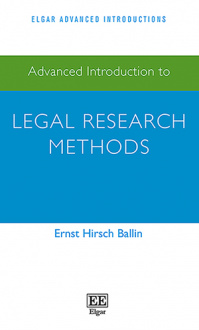
Paperback
Advanced Introduction to Legal Research Methods
Written by Ernst Hirsch Ballin, this original Advanced Introduction uncovers the foundations of legal research methods, an area of legal scholarship distinctly lacking in standardisation. The author shows how such methods differ along critical, empirical, and fundamental lines, and how our understanding of these is crucial to overcoming crises and restoring trust in the law. Key topics include a consideration of law as a normative language and an examination of the common objects of legal research.
More Information
Critical Acclaim
Contents
More Information
Elgar Advanced Introductions are stimulating and thoughtful introductions to major fields in the social sciences, business and law, expertly written by the world’s leading scholars. Designed to be accessible yet rigorous, they offer concise and lucid surveys of the substantive and policy issues associated with discrete subject areas.
In this carefully drafted work, Ernst Hirsch Ballin uncovers the foundations of legal research methods, an area of legal scholarship distinctly lacking in standardisation. Offering a critical overview of the theories underlying methodological research, as well as the methods themselves, the book explores how such methods differ along critical, empirical, and fundamental lines, and how, by building on these approaches, legal research may contribute to well-considered developments in the law. Such explorative research, the author argues, is crucial in overcoming crises and restoring trust in the law.
Key features include:
• an exploration of the common object of legal research: law in the sense of legal rules, decisions, principles and values
• special emphasis on the legal-grammatical category of personhood and on constitutional foundations
• a consideration of law as a normative language intended to guide behaviour
• a consideration of the theoretical underpinnings of legal research methods.
This Advanced Introduction will greatly benefit legal scholars who seek to understand the object and methods of their work, as well as law and philosophy students looking to grasp the theoretical and methodological foundations of law and legal development.
In this carefully drafted work, Ernst Hirsch Ballin uncovers the foundations of legal research methods, an area of legal scholarship distinctly lacking in standardisation. Offering a critical overview of the theories underlying methodological research, as well as the methods themselves, the book explores how such methods differ along critical, empirical, and fundamental lines, and how, by building on these approaches, legal research may contribute to well-considered developments in the law. Such explorative research, the author argues, is crucial in overcoming crises and restoring trust in the law.
Key features include:
• an exploration of the common object of legal research: law in the sense of legal rules, decisions, principles and values
• special emphasis on the legal-grammatical category of personhood and on constitutional foundations
• a consideration of law as a normative language intended to guide behaviour
• a consideration of the theoretical underpinnings of legal research methods.
This Advanced Introduction will greatly benefit legal scholars who seek to understand the object and methods of their work, as well as law and philosophy students looking to grasp the theoretical and methodological foundations of law and legal development.
Critical Acclaim
‘In this wonderfully succinct yet always rigorous volume, Ernst Hirsch Ballin models the very open-mindedness that he rightly identifies as essential to pushing beyond traditional jurisprudence. The result is an excellent introduction to various methodological and theoretical approaches to legal scholarship—what we might call semantic-behavioural, critical-discursive, genealogical-historical, empirical-social scientific—which together show the rich potential of law as an innovative discipline. We owe Hirsch Ballin a debt of gratitude for offering this always fair-minded and insightful take on a perennially challenging and contested topic.’
– Peter L. Lindseth, University of Connecticut, School of Law, US
– Peter L. Lindseth, University of Connecticut, School of Law, US
Contents
Contents: Preface 1. Common object of legal research 2. Critical angles in legal research 3. Empirical legal research 4. Fundamental research 5. Humans in law’s grammar 6. Explorative research 7. Epilogue: horizons of legal research Glossary Bibliography Index



